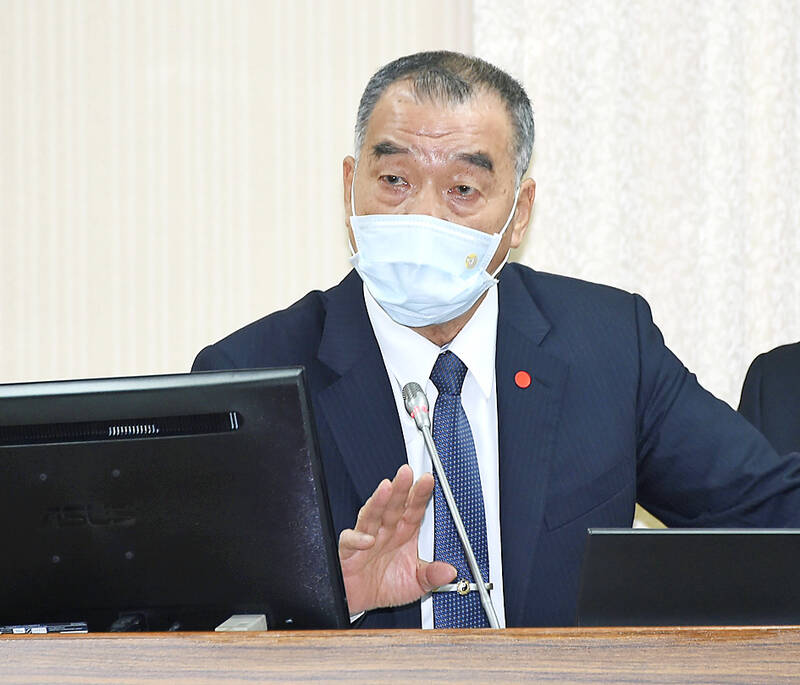The current military situation across the Taiwan Strait could take a turn for the worse if not handled cautiously, Minister of National Defense Chiu Kuo-cheng (邱國正) said yesterday, adding that the nation’s armed forces are always prepared and constantly sharpen their abilities.
At a meeting of the legislature’s Foreign and National Defense Committee, Chinese Nationalist Party (KMT) caucus whip William Tseng (曾銘宗) voiced concerns over the delay of several arms sales, which might affect the combat capabilities of the armed forces.
Chiu said that concern “is what the enemy hopes for,” as it allows them to make a move before Taiwan is prepared, but the armed forces “would not be sitting around waiting,” and would continue to train with existing weapons.

Photo: Tu Chien-jung, Taipei Times
The armed forces are always preparing for war and continuing to improve, Chiu said, adding that they could readily switch from a peacetime footing to a wartime one when the situation demands.
Chiu said that his ministry had agreed to raise the monthly salary for mandatory conscripts from NT$6,510 to NT$15,000 “if everyone thinks it’s acceptable.”
The military initially hoped the monthly salary could be increased to NT$25,000 based on the minimum wage, which is to be raised to NT$26,400 per month and NT$176 per hour next year, Chinese-language Credere Media reported on Wednesday last week, but the Executive Yuan had proposed raising a conscript’s monthly salary to NT$15,000 based on the minimum cost of living, which varied from NT$14,000 to NT$19,000 in different cities and counties.
Directorate-General of Budget, Accounting and Statistics Minister Chu Tzer-ming (朱澤民) on Thursday last week said that raising conscripts’ monthly salary to NT$15,000 was acceptable.
Separately yesterday at a meeting of the legislature’s Judiciary and Organic Laws and Statutes Committee, Tseng asked about the impact on Taiwan of Chinese President Xi Jinping (習近平) being granted a third term at the head of the Chinese Communist Party (CCP) Central Politburo Standing Committee.
National Security Bureau (NSB) Deputy Director-General Chen Chin-kuang (陳進廣) said that at the CCP’s 20th National Congress on Saturday the party included a clause in its constitution saying that it is “adamantly against Taiwan’s independence.”
Chen said that the newly appointed vice chairman and several members of the Central Military Commission have served in the Chinese People’s Liberation Army’s Eastern Theater Command or the Vietnam War.
When China’s economic growth begins to slow and its grip on society encounters challenges, the CCP might take action to shift the public’s attention from domestic affairs to foreign affairs, he said.
Asked by Tseng whether the NSB thought a war would break out in the Taiwan Strait within three years, Chen said: “Taiwan has to be prepared for every possible situation.”
When pressed for a response on the possibility of war within a year, Chen said: “We will not rule out the possibility” that Beijing, in a bid to divert some of its internal pressure, could use coercion as an approach, forcing Taiwan to reach a peace deal on the premise of unification.
Additional reporting by Aaron Tu

A magnitude 7.0 earthquake struck off Yilan at 11:05pm yesterday, the Central Weather Administration (CWA) said. The epicenter was located at sea, about 32.3km east of Yilan County Hall, at a depth of 72.8km, CWA data showed There were no immediate reports of damage. The intensity of the quake, which gauges the actual effect of a seismic event, measured 4 in Yilan County area on Taiwan’s seven-tier intensity scale, the data showed. It measured 4 in other parts of eastern, northern and central Taiwan as well as Tainan, and 3 in Kaohsiung and Pingtung County, and 2 in Lienchiang and Penghu counties and 1

A car bomb killed a senior Russian general in southern Moscow yesterday morning, the latest high-profile army figure to be blown up in a blast that came just hours after Russian and Ukrainian delegates held separate talks in Miami on a plan to end the war. Kyiv has not commented on the incident, but Russian investigators said they were probing whether the blast was “linked” to “Ukrainian special forces.” The attack was similar to other assassinations of generals and pro-war figures that have either been claimed, or are widely believed to have been orchestrated, by Ukraine. Russian Lieutenant General Fanil Sarvarov, 56, head

SAFETY FIRST: Double the number of police were deployed at the Taipei Marathon, while other cities released plans to bolster public event safety Authorities across Taiwan have stepped up security measures ahead of Christmas and New Year events, following a knife and smoke bomb attack in Taipei on Friday that left four people dead and 11 injured. In a bid to prevent potential copycat incidents, police deployments have been expanded for large gatherings, transport hubs, and other crowded public spaces, according to official statements from police and city authorities. Taipei Mayor Chiang Wan-an (蔣萬安) said the city has “comprehensively raised security readiness” in crowded areas, increased police deployments with armed officers, and intensified patrols during weekends and nighttime hours. For large-scale events, security checkpoints and explosives

‘POLITICAL GAME’: DPP lawmakers said the motion would not meet the legislative threshold needed, and accused the KMT and the TPP of trivializing the Constitution The Legislative Yuan yesterday approved a motion to initiate impeachment proceedings against President William Lai (賴清德), saying he had undermined Taiwan’s constitutional order and democracy. The motion was approved 61-50 by lawmakers from the main opposition Chinese Nationalist Party (KMT) and the smaller Taiwan People’s Party (TPP), who together hold a legislative majority. Under the motion, a roll call vote for impeachment would be held on May 19 next year, after various hearings are held and Lai is given the chance to defend himself. The move came after Lai on Monday last week did not promulgate an amendment passed by the legislature that